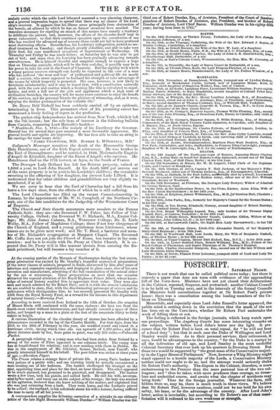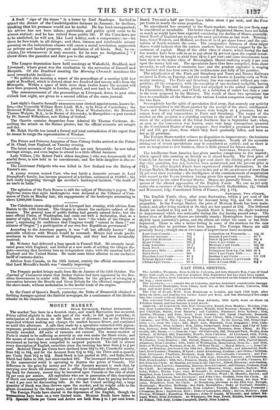POSTSCRIPT.
SATURDAY NIGHT. There is not much that can be called political news today; but there is scarcely a paper that does not teem with evidences of the approaching fall of the Corn-laws. Ministers have not yet closed their deliberations in the Cabinet repeated, frequent, and protracted: another Cabinet Connell is to be held on Tuesday next, and in the intervals of the formal Councils the Ministers hold consultations together at Sir Robert Peel's private house: there was a consultation among the leading members of the Ca- binet on Thursday.
Meanwhile, and especially since Lord John Russell's letter appeared, the public mind is settling down in the conviction that the mark of the axe has been set on the Corn-laws, whether Sir Robert Peel undertake the work of felling them or not.
The feeling is reflected in the foreign journals, which keep watch upon our proceedings. The Augsburg Gazelle has some interesting remarks on the subject, written before Lord John's letter saw the light. It pre- sumes that Sir Robert Peel is bent on total repeal, for "he will not hear of a fixed duty "; but that in such case the Duke of Wellington and Lord Stanley would retire. As to their personal services, their retirement, it says, would be advantageous to the country, "for the Duke is a martyr to all the infirmities of old age, and Lord Stanley is the most unskilful Colonial Secretary that ever took up his quarters in Downing Street. But those two would be supported by "the great mass of the Conservative majori- ty in the Upper House of Parliament." Now, however a Whig Ministry might stand opposed to a hostile majority of the Lords, a Conservative Ministry neither could nor ought to do so; and the attempt would seriously shake Sir Robert Peel's authority. The dispute in the Cabinet, therefore, is more embarrassing to the Premier than the mere personal loss of the two col- leagues; and "thus he takes, with more prudence than courage, an irreso- lute and undecided course, and awaits what the chapter of accidents may bring forth? Thus far the foreign journalist. Whatever the facts, still hidden from us, may be, there is much truth in these views. We believe that Sir Robert Peel, however cautious, could not be too bold for his own safety, his fame, or for the advantage of the country. After Lord John's letter, action is inevitable; but according to Sir Robert's use of that mani- festation will it redound to his own weakness or strength.
A fresh "sign of the times" is a letter by Earl Stanhope. Invited to attend the dialler of the Cambridgeshire farmers in January, he declines, thinking that his presence would not be useful. He has been unsupported; his advice has not been taken; patriotism and public spirit seem to be almost extinct; and he has retired from public life. If the Corn-laws are to be abolished, he will not, like Lord Ashley, seek a compromise: no—let there be free trade in all things; and then, intense and intolerable misery pressing on the industrious classes will cause a social revolution, aggression on private and landed property, and spoliation of all kinds. But, he ex- claims, [to whomsoever it may concern, for he uses no designation,] "I throw down the gauntlet and dare you to the attempt."
The League deputation have held meetings at Wakefield, Bradford, and Liverpool; where great was the exultation in the accession of Russell and Morpeths Of the Bradford meeting the Morning Chronicle mentions the most remarkable incident- " We publish this morning a report of the proceedings of a meeting held last night at Bradford, which is distant about two hundred and twenty miles from the Metropolis. Within a space of little niece than twelve hours the account will have been prepared, brought to London, printed, and sent back to Yorkshire."
The commencement of the proceedings at Liverpool, down to past nine o'clock last night, are given in a second edition of the same journal.



























 Previous page
Previous page